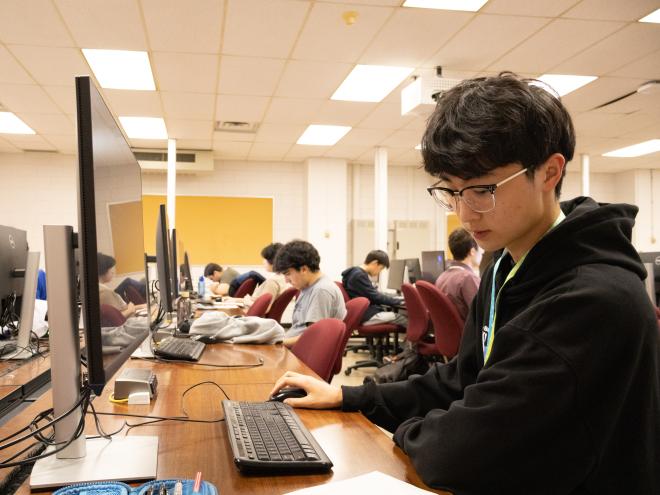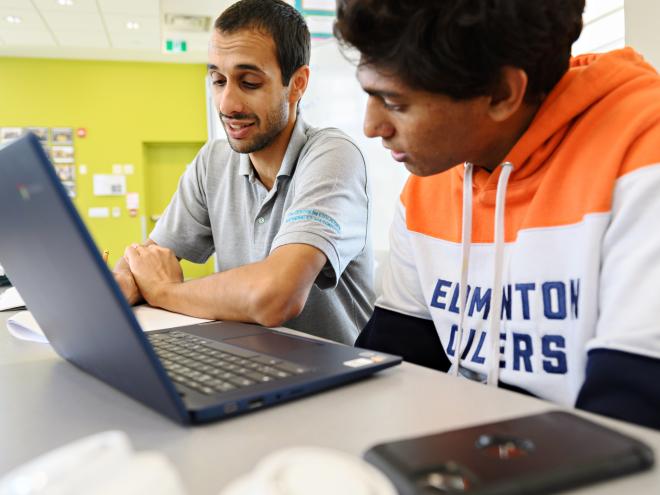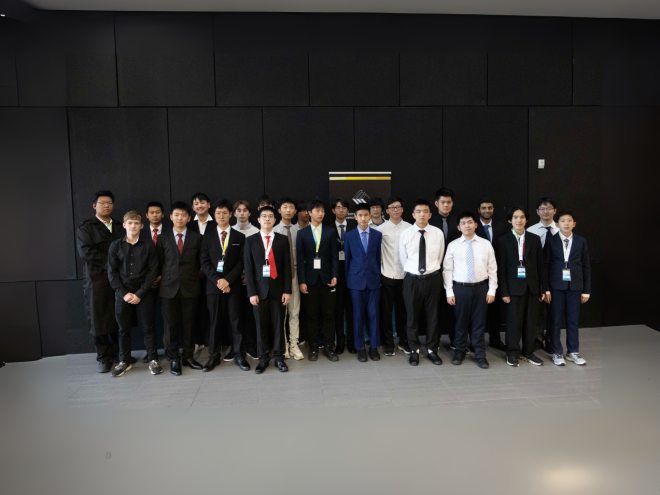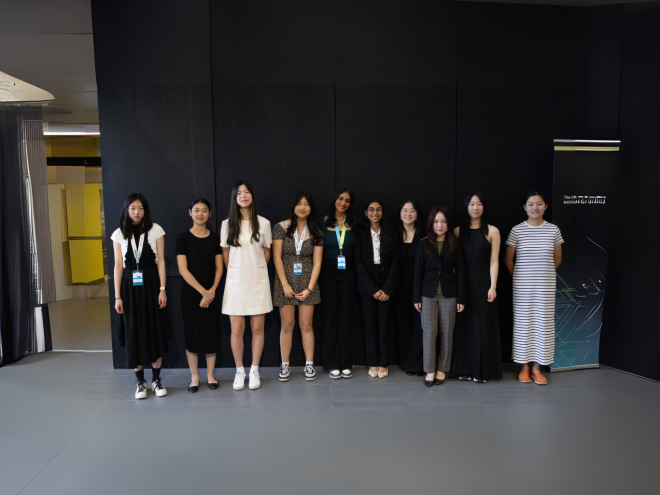
Important dates
The Canadian Computing Competition (CCC) is usually held in the month of February. Contest dates for 2026/2027 will be updated in March 2026.

Contest overview
The Canadian Computing Competition (CCC) is a fun challenge for participants with an interest in programming. Designed to be both accessible to participants with some programming experience and to challenge the keenest programmers at the secondary school level, the CCC helps participants build confidence and grow their ability to understand, design, and implement algorithms.
CEMC stories
Our contests, programs, tools, and resources have a significant impact on students and educators worldwide.

Canadian Computing Olympiad
The Canadian Computing Olympiad (CCO) is a week-long learning experience featuring workshops, a contest and other extracurricular activities. This invitation-only event is also used to select Canada's teams for the International Olympiad in Informatics (IOI) hosted by a different country each year.
Approximately 20 of the top official CCC Senior participants from schools in Canada are invited to the CCO at the University of Waterloo each spring. Outstanding participants, including those who are Canadian citizens or permanent residents attending school outside of Canada, may also be invited. The selection of CCO participants and the Canadian IOI team members is at the discretion of the CEMC.

Canadian Informatics Workshop
The Canadian Informatics Workshop (CIW) is a unique opportunity created especially for female-identifying and non-binary official CCC Senior participants from schools in Canada. This workshop invites top performers to spend a week on campus at University of Waterloo each spring to enhance their programming skills, attend expert-led lectures, compete in a contest and connect with peers who share their passion for competitive programming. Outstanding participants, including those who are Canadian citizens or permanent residents attending school outside of Canada, may also be invited. This event is usually used to select Canada's team for the European Girls' Olympiad in Informatics (EGOI) hosted by a different country each year.
However, in 2026, the European Girls' Olympiad in Informatics (EGOI) will be held from May 12 to May 18, 2026 in Italy. Due to the timing, selection for the Canadian EGOI team will be by invitation and held online from 7:00–9:00 p.m. EST on Tuesday, March 3 and Thursday, March 5, 2026 prior to the CIW.
The selection of CIW participants and the Canadian EGOI team members is at the discretion of the CEMC.
Contest details
Participants have the option to compete at either the Junior or Senior level. We advise participants and educators to adhere to these guidelines:
- Junior level - any participant with beginner to intermediate programming skills.
- Senior level - any participant with intermediate to advanced programming skills.
In particular, each participant can choose the best level for them, regardless of their grade.
The Canadian Computing Competition (CCC) is usually held in the month of February. Contest dates for 2026/2027 will be updated in March 2026.
Contest timing: We encourage schools to administer the contest as close to the beginning of the school day as possible in their respective time zones.
- Written in school, participants write online, individually.
- 5 questions.
- Time allowed for completion is 3 hours.
- Score out of 75.
The CCC is divided into two levels: the Junior competition and the Senior competition. Each contest consists of 5 questions. Each question is worth 15. The range of difficulty generally increases from the first question to the last question on each contest. Approximate outlines are given below.
| Junior Competition | |
| Questions 1 and 2 |
Straightforward (e.g. basic loops and conditions) |
| Questions 3 and 4 |
More challenging (e.g. some combination of loops, conditions and counting) |
| Question 5 |
Progressively advanced material (e.g. recursion, two-dimensional arrays, efficient/insightful algorithms) |
| Senior Competition | |
| Questions 1 and 2 |
Basic algorithms (e.g. sorting, searching) |
| Questions 3 and 4 |
More advanced algorithms (e.g. careful counting, more advanced mathematical reasoning) |
| Question 5 |
IOI level question |
Problems may be broken down into subtasks, with a partial score awarded for each subtask, which can make the problems more approachable. For example, participants may earn a partial score for solving an easier, restricted, version of a problem. Subtasks can also make problems more challenging. For example, for later questions, a score might be assigned for input that only efficient solutions can solve within the time limits.
Contest supervisors are able to view participants’ real-time performance by viewing the scoreboard listing participants at their school.
CCC participants may use C, C++, Python 2, Python 3, or Java. Visit sample programs and details to know more about these languages.
CCO participants must use C++. CIW participants must use C++ or Python.
While the CCC Online Grader supports various languages, it may not always be possible to achieve a perfect score with a particular language choice (for example, Python or Java) because the design of some languages limits the participants’ ability to solve the hardest part of the hardest problems.
All participants and educators should familiarize themselves with the CCC Rules which encompass implementation details, submission guidelines, feedback, scoring details and use of the Internet, references and other tools during the competition.
Below are links to four types of resources and classroom support that can help with preparation for the Canadian Computing Competition (CCC):
- CCC Online Grader: The CCC Online Grader, where participants can create a free practice account and access previous contests.
- Past Contests: Past contests, example programs illustrating input and output and CS Circles.
- Books: Competitive Programming by Halim and Halim and Competitive Programmers Handbook by Antti Laaksonen.
- CEMC Visits Schools: Experts from the CEMC are available to conduct problem-solving workshops for students and educators. Visit CEMC Visits Schools to learn more.
- Contest Supervisors should arrange to have participants write the contest in school and are responsible for ensuring that participants are supervised appropriately.
- This contest is written using the CCC Online Grader. The Grader is where supervising educators manage their participants’ accounts and where participating students find problem statements and submit solutions.
- Contest supervisors will need to authenticate their participants to gain access.
- Participants and Contest Supervisors are encouraged to familiarize themselves with the CCC Online Grader and CCC Rules before the official contest date.
- Screen recordings are a new measure being used for the first time this year for the CCC. They will not be a mandatory requirement, but we are hoping for as much participation as possible. The details are as follows:
- For participants aiming to be invited to the Canadian Computing Olympiad (CCO) or Canadian Informatics Workshop (CIW), we strongly recommend that Contest Supervisors arrange to record their screen for the entire duration of the competition. Please do not send screen recordings to the CEMC unless asked. Instead, we request that you keep the recordings for a month after the contest because participants being considered for these events may be asked to send us screen recordings before formal invitations are extended. Note that being asked to provide a screen recording does not guarantee an invitation, and without a screen recording, evidence of broken rules is more likely to lead to disqualification.
- For all other participants, we encourage Contest Supervisors to consider screen recordings. Doing this should complement careful supervision and can be a helpful tool if you suspect a student has broken the rules. These recordings would only be for your own internal use, and we will not ask you to share them with us.
- In case of a technical difficulty like a screen recording failure, we do not want participants to panic and would like to emphasize that the priority is to ensure that participants keep writing the competition.
- Unfortunately, we cannot provide technical support for screen recordings but, when possible, consider using OBS (https://obsproject.com) which is free and open-source software. Unlike some screen recording software built into operating systems, OBS can be used to create files that are under 500MB for a 3-hour recording. Configure and test settings in your environment that eliminate audio, capture one frame of the entire screen/workspace every two seconds, and result in low but sufficient resolution.
- We hope that the logistics for you to record screens are not too burdensome, but we recognize that technology used for the CCC varies widely from school to school, and you may be limited in what software you have access to. Therefore, for this year, screen recordings are optional.
- We recognize that there are already many demands on your time and everything you do to support your students’ participation in the CCC is greatly appreciated.
- Results will be available in the Contest Supervisor Portal within a few weeks of the contest date.
The following is a list of the steps for supervising educators as they prepare for and proctor the CCC. More detailed instructions on how to perform some of these steps are available.
Before the contest
- Provide your participants with your CEMC school number (but not the confidential password) and ask them to create an account here. Participants need only one account, and some may already have existing accounts from previous years. If necessary, you may reset the participant's password for any previously registered participant.
- Log in to the teacher portal using your CEMC school number and password. Once logged in, you will need to “Approve” (or, if they are not your participant, “Delete”) your “Unverified Users”. Participants will then receive an email saying that they can use the CCC Online Grading system, along with their User ID. You should also "Graduate" all past participating students that have left your school, and may choose to "Hide" any of these participants if you do not want to see their records again.
- Familiarize yourself with the CCC Online Grader. In particular, ensure you are familiar with the format, programming language details and rules mentioned in the sections above.
- Encourage participants to practice using the CCC Online Grader. We strongly recommend that every participant attempt the Practice Contest.
- Late (and even last minute) registrants can be accommodated at any time before the start of the contest by ensuring the participants has an authenticated CCC Online Grader account as described above. The CEMC will invoice the school later for extra contests written beyond those initially registered. Please note that extra fees may apply.
Starting the contest
- An individualized 3-hour timer will begin for each participant as soon as they enter biographical information after logging in to the CCC Online Grader.
- Point participants to the problem statements which are PDF files hyperlinked from the problem names. Make them aware of the Announcements / Helpful Reminders that can be viewed after logging in and entering the contest.
During the contest
- Contest Supervisors must ensure that the integrity of the contest is maintained by enforcing the CCC rules. For example, try to prevent communication between participants and forbidden use of the Internet.
- You may view participants’ real-time performance by viewing the scoreboard listing participants at your school.
After the contest
- Upon receiving notification that the scores have been finalized, view the contest scoreboard. Check that the number of participants and their names match your record of who participated in the contest.
- Upon receiving information about the cutoffs, you may generate Certificates of Distinction from the Contest Supervisor Portal.
Contest fee per participant: $10.00
Processing fee per order, applies to all contest orders: $5.00
This contest is tax-exempt within Canada and internationally.
The CEMC does not offer refunds, returns or cancellations of any kind.
We believe that all students will enjoy and benefit from the experience of preparing for and participating in our mathematics and computer science contests. Our contests are not tests or exams. There is no passing or failing score. Information about how participants and schools are awarded for their performance in our computing contests is listed below.
Official participants
Any full-time student may participate in the Canadian Computing Competition (CCC) but only those that qualify as "official" are eligible to be invited to the Canadian Computing Olympiad (CCO), Canadian Informatics Workshop (CIW) or be included on the honour roll.
Participants that write the CCC at a school inside Canada are considered an official participant provided they:
- were born on or after July 1, 2006, and
- live in Canada.
Participants that write the CCC in a school outside Canada are considered an official participant provided they were born on or after July 1, 2006.
All other participants that do not meet the above criteria are considered unofficial. Unofficial participants are still eligible for certificates.
Canadian Computing Competition (CCC) awards
- Every participant scoring in the top 25% of all competitors receives a Certificate of Distinction.
- The names of some top-scoring official participants appear in student honour rolls for the Senior competition.
- We will no longer be publishing student honour rolls for the Junior competition, which is designed to be an individual challenge for students who choose to participate at this level.
- We also encourage schools and boards to internally recognize and celebrate the achievements of those participants who excel.
The CEMC reserves the right to disqualify students or withhold the publication of results at its discretion.
Canadian Computing Olympiad (CCO) awards
Approximately 20 of the top official CCC Senior participants from schools in Canada are invited to the CCO at the University of Waterloo each spring. Outstanding participants, including those who are Canadian citizens or permanent residents attending school outside of Canada, may also be invited.
- Each CCO participant receives a plaque for gold, silver or bronze standing based on their results in both the CCC and CCO competitions.
- Each silver medalist receives a $200 prize.
- Each gold medalist receives a $500 prize.
The selection of CCO participants, the Canadian IOI team members and award distribution is at the discretion of the CEMC.
Canadian Informatics Workshop (CIW) awards
Approximately 10 of the top official CCC Senior participants who are female-identifying or non-binary from schools in Canada are invited to the CIW at the University of Waterloo each spring. Outstanding participants, including those who are Canadian citizens or permanent residents attending school outside of Canada, may also be invited.
- Each CIW participant receives a plaque for gold, silver or bronze standing based on their results in both the CCC and CIW competitions.
- Each silver medalist receives a $200 prize.
- Each gold medalist receives a $500 prize.
The selection of CIW participants, the Canadian EGOI team members and award distribution is at the discretion of the CEMC.
Opt-out option:
Our contests allow participants to opt out of having their names displayed in publicly accessible results booklets if their score is high enough to be listed on an honour roll for the Senior competition. Their names will, however, still be published in the school results which we provide securely to the organizing educator.
Canadian Computing Competition 2025
| Junior | Senior | |
| Average (Mean) | 39.90 | 23.71 |
| Certificate of Distinction Cutoff | 50 | 34 |
| Maximum Possible Score | 75 | 75 |
| Number of Contestants | 4758 | 3917 |
While the Canadian Computing Competition (CCC) is not required for admission to the Faculty of Mathematics at the University of Waterloo, strong performance the contest can help a student earn admission.

Contest results
The results booklet for the CCC includes statistics about the contest, commentary about contest questions and an honour roll consisting of top performing participants on the CCC Senior. Top Senior participants may be invited to the Canadian Computing Olympiad (CCO) and Canadian Informatics Workshop (CIW). Educators can access their participants' results and generate certificates after the final results are uploaded in our Contest Supervisor Portal.
